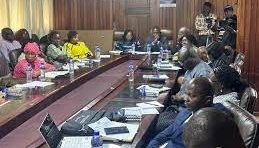A high-level stakeholders meeting was successfully held yesterday in Freetown to address the alarming rise in Sexual and Gender-Based Violence (SGBV) across Sierra Leone. The session brought together key representatives from government ministries, including the Minister of Gender and Children’s Affairs, Dr. Isata Mahoi; Gender Adviser at the Office of the President, Madam I.J. Kabba; Director of Rainbo Initiative, Daniel Kettor; the Minister of Justice; civil society organizations; development partners; and advocacy groups to review data trends, identify policy gaps, and reinforce a multi-sectoral response to SGBV.
In her opening remarks, Dr. Mahoi welcomed stakeholders and development partners, reiterating the urgent challenges faced by survivors and the disturbing reports emerging nationwide. She reaffirmed the ministry’s commitment to a coordinated, survivor-centred approach focused on prevention, response, and accountability.
Dr. Mahoi highlighted the expansion of One-Stop Centres to two additional districts—bringing the total to seven, aimed at reducing risks and improving access to support services. “This includes a modern One-Stop Centre constructed in Koinadugu by Medicos Del Mundo,” she noted.
She also emphasized efforts to strengthen the 116 hotline and enhance the E-Referral System to connect survivors with timely and essential services.
She further underscored national frameworks such as the National Referral Protocol (NRP) and capacity-building initiatives, stressing the need to empower vulnerable communities and deliver responsive, impact-driven solutions.
Speaking on behalf of the Office of the President, Madam I.J. Kabba acknowledged the collective efforts of government officials, CSOs, and development partners, describing the meeting as a “call to action” and a moment for reflection, also expressing deep concern over the growing threat SGBV poses to women and children.
She emphasized that a data-driven roadmap is essential to strengthening accountability mechanisms and enhancing inter-agency collaboration. “Our goal is to reaffirm our national commitment to justice, equity, and protection, ensuring that every response is rooted in survivor-centred principles and aligned with gender-responsive governance,” she stated.
Presenting a comparative survivor data analysis, Rainbo Initiative Director Daniel Kettor revealed that reported SGBV cases increased slightly from 2,561 in 2023 to 2,607 in 2024 (a 1.8 percent increase). Physical assault cases declined from 201 in 2023 to 164 in 2024, showing an 18.41 percent decrease. Gender-disaggregated data showed a slight drop in male survivor cases—from 29 in 2023 to 27 in 2024.
Further analysis covered SGBV’s impact on persons with disabilities, pregnancy-related outcomes, and regional case distribution.
Ramatu Kargbo, Consultant at the Ministry of Gender and Children’s Affairs, presented on prevention and response systems, including major achievements since 2020. She highlighted the establishment of seven One-Stop Centres, the introduction of the GBVIMS+ System in May 2023, and the National Male Involvement Strategy for prevention. “All of these frameworks are designed to confront these challenges comprehensively,” she noted.
Participants reaffirmed their shared commitment to strengthening gender-responsive governance, survivor-centred services, and accountability systems. The meeting concluded with a pledge to prioritize urgent, coordinated, and community-based action.
A comprehensive report detailing key deliberations and next steps will be released soon, marking a critical milestone in Sierra Leone’s fight against SGBV.
By Kelvin Mark Kargbo












